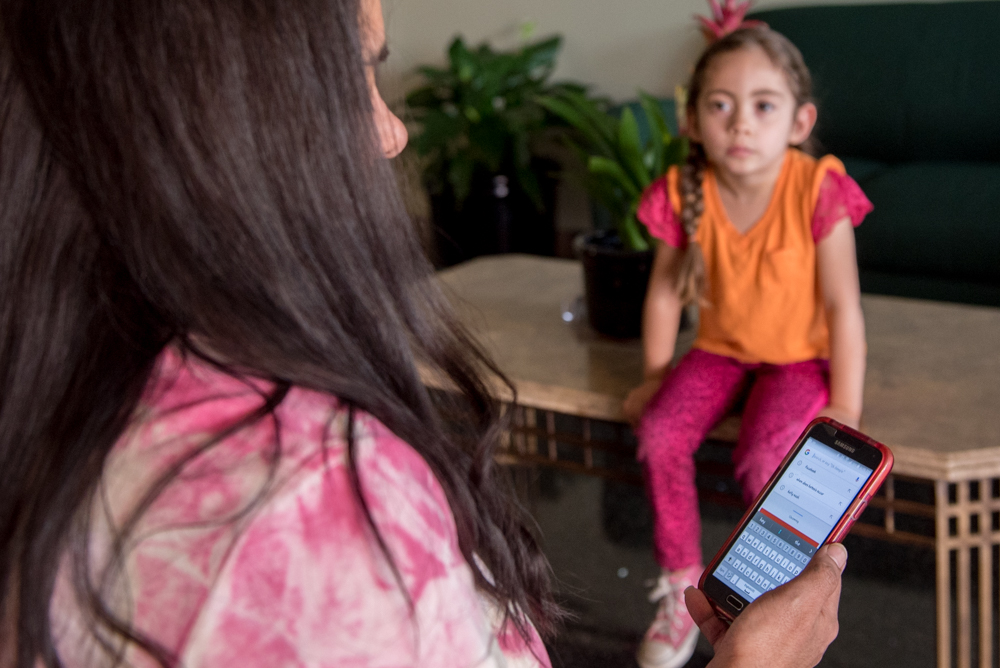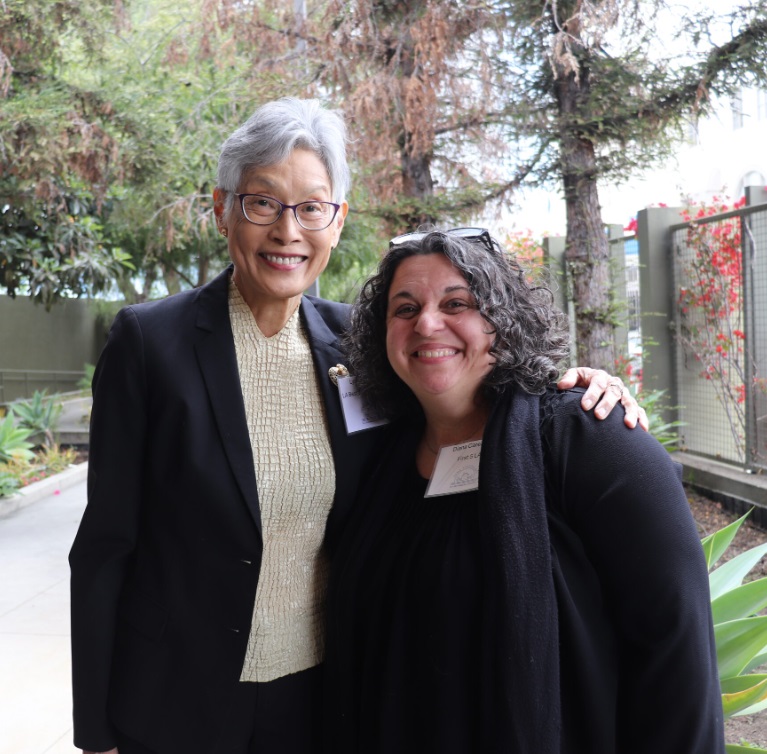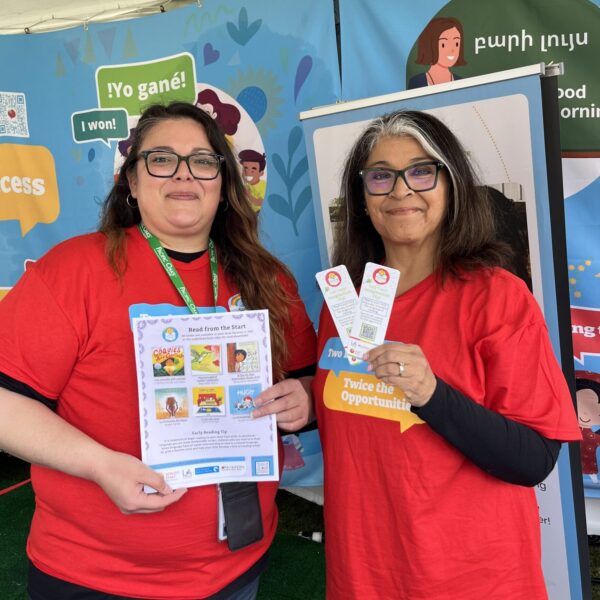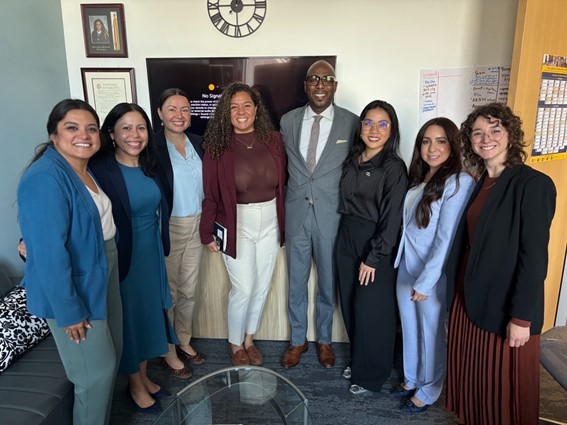Amberlyn Garrubba was consumed.
At mealtime with her husband and three children under 5 years old, the Palmdale mother sometimes served their dinner cold. She spent half the night awake and five hours a day posting thoughts and ideas on social media. She scheduled her everyday life around her Twitter Party calendar. At the park, she would focus on her phone while her children pleaded with her to push them on the swings.
“Because of the cellphones, we are not talking to our children, and that causes a problem” – Enedina Meza
“My children scolded me and would say, ‘You only care about your phone! You only care about your Twitter! Oh, look, mom is taking selfies again!’” Garrubba recalled.
Meanwhile, Enedina Meza was experiencing similar issues with digital distraction in East LA with her husband, Pedro. During mealtime, Pedro could not pull himself away from Facebook and into conversations with his four children.
“Because of the cellphones, we are not talking to our children, and that causes a problem,” Meza recalled of her frustration with her husband. “We don’t know how their day went or what they are feeling.”
Further away, Dr. Dana Suskind was doing her medical rounds at the University of Chicago Medical Hospital. When she stepped into the examination rooms, she said, “every parent and child I encountered who was over 1 year old was manipulating a smart phone. It was shocking.”
* * *

Suskind’s geographic distance from Los Angeles County does not diminish the importance of her observation to Angelenos. If anything, it strengthens the cause for concern.
Suskind is the author of the best-selling book Thirty Million Words: Building a Child’s Brain, and the founder and Director of the Thirty Million Words Initiative (TMW), a program designed to harness the power of parent language to build a child’s brain and impact his or her future. TMW is based on scientific research in 1995 which revealed that children in lower socioeconomic classes heard 30 million fewer words by their 4th birthdays than other children, and that young children who heard more words did better when they entered school.
“Everywhere you go, you find parents more focused on their devices than their children” – Dr. Dana Suskind
“Smartphone-distracted parents are everywhere; it’s a phenomenon that crosses cultures, educational levels, and socioeconomic status,” Suskind said. “Everywhere you go, you find parents more focused on their devices than their children. While the true cost of this inattentiveness is not fully known, it’s sure to be profound, especially for very young children.”
Suskind cites a fact commonly promoted by First 5 LA: most physical brain development occurs during the first three years of life: “Our early exposure to language defines our brains and determines our ability to learn. Parent talk impacts everything: intelligence, vocabulary, math and spatial reasoning, behavior, resilience, creativity; the list goes on.”
Suskind added, “Within every parent lies the ability to harness the power of their words to build their child’s brain and shape their child’s future. But first, they must put down their phones. In very basic terms, a parent texting or talking on a smartphone isn’t interacting with his or her child. That child is missing out on crucial brain-building opportunities.”
Indeed, recent research reveals that mobile devices can inhibit parent-child interaction. A 2015 survey on parenting and smart phones also found:
- 54 percent of children surveyed said their parents check their phones too often.
- 36 percent said their parents allowed themselves to be distracted by their device during conversations.
- 32 percent of the children reported feeling unimportant when their parents are distracted by their mobile devices.
“We hear a lot about the wonders of technology, and not enough about the importance of the parent-child bond, with the result being that parents may be less mindful of how their smartphone overuse can affect their children’s development,” said child and adolescent psychologist Dr. Richard Freed, author of the book Wired Child: Reclaiming Childhood in a Digital Age.
Signs indicate that this smartphone and tablet “overuse” may climb even more in the future. According to Forrester research and projections:
- By the end of 2016, 46 percent of the entire global population will be smartphone users.
- About 57 million U.S. adults owned tablets in 2012, a number expected to triple by 2017.
 Even before they can walk, some children are following in their parents’ digital footsteps.
Even before they can walk, some children are following in their parents’ digital footsteps.
According to a 2015 study, up to half of very young children had used smartphones and tablets in some way before their first birthday. By 2 years of age, more than one out of four children were using mobile devices for at least an hour a day. Parents often used these devices to calm or entertain their baby or toddler while they were busy doing chores or running errands, the study showed.
Despite this, the study revealed that many of these same parents were concerned about their young child’s use of mobile media – saying that they did not know how to take the device away from their child, how to judge a good or bad app or even how to interest their child in hands-on, interactive play with parents, caregivers, siblings or other children.
Even the late Steve Jobs, who inspired the daily use of mobile media for a whole generation, appeared to share parental concerns about his kids’ tech use: family dinners at his home were free of iPads.
And while mobile media is powerful enough to bring the far reaches of the world into the palm of our hands, it can also push away those closest to us. This phenomenon was captured in a recent exhibit entitled “Removed” by photographer Eric Pickersgill.
Digital devices can provide important tools for parenting, as well. These include: calendaring meetings with preschool instructors, video-conferencing in co-parenting situations, capturing video of a baby’s first steps, recording a birthday wish for grandparents, watching a how-to-video to teach your toddler to tie their shoes, streaming a playlist of lullabies, finding a parent support group on social media and arranging a play date.
“You can get pulled over for texting and driving a car. Are we heading towards a future where you can get cited for tweeting while parenting?” – Judith Carey-Fisher
And just as “Sesame Street” has brought the learning of letters and numbers through the television screens of millions of young children, there are researchers conducting studies that show that mobile media can have a positive educational impact on young children.
Some education experts like Susie Grimm have seen it happen first hand.
“If used intentionally and appropriately, digital devices and technology can support learning and skill development in vocabulary acquisition (especially for dual language learners), math content, pro-social behavior and basic reading skills,” said Grimm, the Early Learning Manager at PBS SoCal, whose Ready to Learn program provides digital/tech experience through parent workshops throughout Southern California. “But just like with hands-on activities, children will learn the most when parents are also engaged. Co-viewing and co-playing offer the best chance of learning with digital devices.”
* * *
While it may take years to understand the overall impact of “iPad parenting”, First 5 LA recognizes the ongoing, critical need for parent-child interaction by funding a number of initiatives that promote parent engagement with their children, other parents and their communities. Most of these initiatives are included in the Families and Communities Target Outcome areas in First 5 LA’s 2015-2020 Strategic Plan.
One parent-inspired effort will ask digitally-addicted dads and moms to simply unplug.
Next month, city kiosks, buses and storefronts in Long Beach will carry posters, flyers and signs urging parents and caregivers to “unplug” their mobile media in order to play, cook, dance, read and explore with children ages 0 to 3. The campaign will also feature brief videos of local parents spreading the message on social media and local websites.
As part of an initial $20,000 investment by First 5 LA, this public education campaign is a community-identified project under the Long Beach Child Abuse and Neglect collaborative within the Best Start Central Long Beach Community Partnership. Located in 14 regions throughout Los Angeles County, Best Start is a place-based initiative that is one of First 5 LA’s signature investments.
Judith Carey-Fisher, co-founder of Connecting the Dots Group, is the consultant facilitating the public education campaign. As she explained: “The campaign is designed to help build awareness among parents and caregivers on how digital devices, when overused to the point of distraction, can be harmful to the well-being of their children.”

Added Carey-Fisher: “You can get pulled over for texting and driving a car. Are we heading towards a future where you can get cited for tweeting while parenting?”
Farther north, members of Best Start Community Partnerships from throughout Los Angeles County recently gathered to encourage a different kind of parent-child engagement.
“In today’s world of advanced technology, parents are often handing a child an iPad or a phone to either help their child learn or keep them entertained,” said First 5 LA Communications and Marketing Officer Sheila Rodriguez. “It’s important that parents and children also reach for books together. Spending quality time reading to children stimulates their imagination and, more importantly, creates long lasting memories with their parents.”
Rodriguez helped coordinate an event held by Best Start Panorama City & Neighbors (PCN) and the Los Angeles Public Library to present a Read Aloud Training to other Best Start Community Partnerships. Like PCN has done, the goal was to train partnership members – most of whom are parents – on how best to read aloud with children and encourage them to start reading programs for young children in their communities.
The parents particularly enjoyed the reading of Press Here, which illustrated – literally – that a book can be just as interactive as a digital device.
“It’s something to moderate our use of technology,” PCN member Veronica Montano-Sanchez said of the book. “If it comes down to us reading to our children or them playing with technology, they prefer the human interaction.”
Added psychologist Freed: “Snuggling up with a young child and a book is a magical experience that promotes language development and – because the parent is bringing the story to life – builds kids’ attachment to parents.”
“If it comes down to us reading to our children or them playing with technology, they prefer the human interaction” – Veronica Montano-Sanchez
Diane Olivo-Posner, acting principal librarian of Children’s Services at the Los Angeles Public Library, said reading to a child can impact their future literacy level: “If children know eight nursery rhymes by heart by the time they are 4 years old, they are usually the best readers by the time they are 8.”
One of the Read Aloud Training participants was Enedina Meza, who had been having the Facebook problem with her husband. As a member of Best Start El Monte/South El Monte, she had begun participating in other Best Start trainings about parental interaction. She took what she learned about not having cell phones at the table home to her husband.
“He said, ‘You’re right, you’re right,’” Meza recalled. “Now he puts the phone down and helps in the mornings, getting the kids ready for school. “He even hugs them, tells them he loves them and takes one of them to school. Now we’re working as a team.”
As advances in digital devices push more people to go online, one First 5 LA investment illustrates the importance of offline resources with a hands-on approach: handouts.
Since 2013, First 5 LA has provided funding for the Little By Little school readiness program, which helps children prepare for kindergarten by encouraging parents to provide a rich home literacy environment. First 5 LA’s six year, $30 million investment serves 60,000 unique participants yearly through 10 Women, Infants and Children (WIC) centers throughout Los Angeles County.
 During four visits to participating WIC centers per year, mothers and caregivers receive educational materials on their child’s development and an age-appropriate book for their child. While most of the materials are designed to boost early literacy, sometimes they can lead to a life-altering discovery.
During four visits to participating WIC centers per year, mothers and caregivers receive educational materials on their child’s development and an age-appropriate book for their child. While most of the materials are designed to boost early literacy, sometimes they can lead to a life-altering discovery.
Several months ago, Miriam, a mother of two in Commerce, noticed that her 2-1/2 year old son was not meeting the milestones for his age according to the Little By Little handouts.
“He was not engaging in peek-a-boo and he was non-verbal at a time when he should have been speaking 30 or 40 words,” Miriam recalled. “The handouts made me realize he was very behind.”
Tests revealed that her son had mild autism. Miriam was able to get him into speech therapy and a Mommy & Me class. Today, she said, her son is speaking a lot more words.
“There are a lot of first-time moms like me who don’t know where their children should be developmentally,” Miriam said. “Those handouts help us know how to help our children. I’m glad that I was able to detect the issue early so that he can have improvement by the time he goes to school.”
* * *
First 5 LA will continue to promote parent engagement with their children, other parents and their communities through a variety of new and ongoing campaigns, presentations and projects:
• A countywide Family Strengthening Public Education Campaign will kick off in various media streams this spring to promote awareness to parents and caregivers of the protective factors, encouraging positive change in their daily interactions with their child, social network and community.
• A panel of experts will address the First 5 LA Board of Commissioners in May to explore multiple aspects of family engagement and its impact on the work of First 5 LA, from promoting bonding and attachment to building strong communities and changing systems that impact children’s health and school readiness.
• From “Parent Cafes” to mentoring for young parents, community-identified projects with social connections as the core result have been adopted in the Best Start Community Partnerships of Compton/East Compton, Metro LA, Panorama City & Neighbors, Watts/Willowbrook and Wilmington.
• First 5 LA’s free, quarterly Parenting Guide, distributed to WIC centers, provides parenting tips, child development milestones and fun activities to engage young children.
• First 5 LA’s new parenting website includes all of First 5 LA’s parenting content in one, easy-to-access location with multiple topics, and includes a new, robust family event calendar and family friendly coupons.
• Featuring expert guests, First 5 LA’s Twitter Chats, #First5Chats, are held the first Tuesday of each month. Each one provides an opportunity for partners and parents to discuss topics online that are important to a child being ready to succeed in kindergarten, from coping with tantrums to the use of technology around young children.
One of those attending that First 5 LA Twitter Chat on interactive media use around young children was Amberlyn Garrubba, the social media-addicted mom from Palmdale who was too absorbed in her phone to push her children on the playground swings.
Ironically, it was through social media that Garrubba learned how to set an example for her children’s use of digital devices.
“I needed to set a healthy tech example for them, and since children learn through example, I had to practice what I preached to them.” – Amberlyn Garrubba
“The Twitter Chat helped me realize I needed time limits myself,” she said. “I needed to set a healthy tech example for them, and since children learn through example, I had to practice what I preached to them.”
Today, Garrubba’s children have time limits for using the family’s digital devices, which have parental controls to prevent adult content from popping up. She and her husband encourage their children’s educational and creative use of mobile media, along with age-appropriate games.
.jpg) For her part, Garrubba has learned to tweet less and parent more.
For her part, Garrubba has learned to tweet less and parent more.
“It took a long time for me to break this habit, deleting apps from my phone and disabling notifications,” she said. “I now don’t bring my phone everywhere with me and turn it off often. There are no devices at the table or daily functions. I feel I’ve overcome my tech addiction and just hope it doesn’t consume my kids one day.”
.png) * * *
* * *
How do you best use screens from smartphones and tablets to computers and TVs to help in the process of parenting? (Our take: Be as present as possible while parenting, and wait until the kids are asleep before spending time online.) Digital platforms offer parents new ways to learn, connect and grow. Here are some online resources for parents in L.A. County to explore:
• Visit 211la.org/#prev to be connected with the services families need for themselves or their children, including health care and mental health services.
• Visit publichealth.lacounty.gov/mch/LAMOM/LAMOM.htm, where moms can access information on contraception, mental health, overcoming barriers to health, stress and nutrition.
• Visit UCLA’s TIES (Training, Intervention, Education, and Services for Families) program attiesforfamilies.ucla.edu/resources_parents.aspx for information on a variety of parenting issues and programs.
• Visit First 5 LA’s parenting website at First5LA.org/parenting for resources, news, tips, ways to connect to other parents, information, and fun ideas for activities and more.






